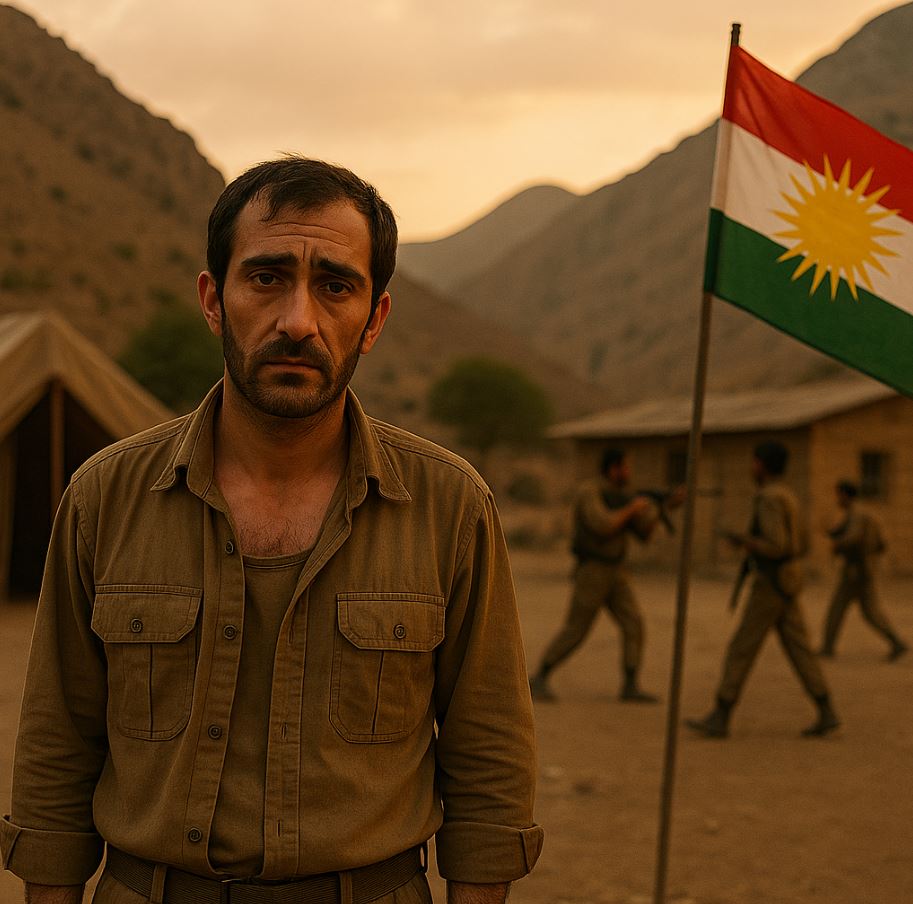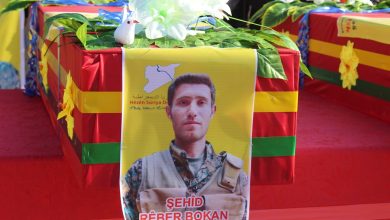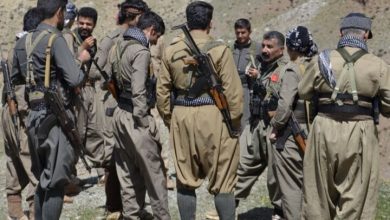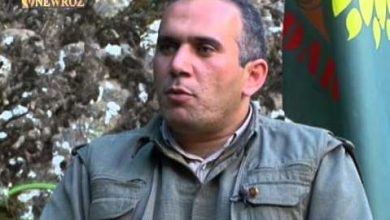Behrouz Safarian: “When we joined the PAK group, they initially treated us very well. They said they could support us and made promises about helping the Kurdish people.”
The phenomenon of individuals joining terrorist and armed groups is a complex and multifaceted issue in the realm of social sciences and sociology. This phenomenon is not only linked to individual reasons but also to social, economic, and political factors. In today’s world, given rapid global developments and the emergence of new groups with differing ideologies, examining the reasons and consequences of individuals joining these groups is of particular importance. This topic can help us better understand the social and political challenges present in societies and offer effective solutions to combat these crises.
In this regard, a case study of an individual who joined the PAK terrorist group can assist us in a more precise analysis of this phenomenon. The case of Behrouz Safarian, born in 1980 in Ilam, who grew up in a middle-class family, is indicative of individuals who are drawn to such groups under specific social and economic conditions. After divorcing his wife and being unable to pay her mahrieh (dower), he faced psychological and social pressures that led him to make dangerous decisions. This decision was not only a result of his individual problems but also a consequence of the broader social and economic conditions in Iran that have presented many young people with serious challenges.
Behrouz Safarian, after being introduced to the PAK group through an acquaintance, established connections via social media. He joined the group with the goal of migrating to Europe and finding work. This process highlights the significant role of social networks and cyberspace in recruiting individuals into armed groups. Furthermore, his illegal departure from the country and his enlistment as a peshmerga for a year emphasize the critical situation faced by a segment of young Iranian Kurds. During this time, he received training in various political, military, and linguistic fields, which demonstrates the efforts of terrorist groups to organize and train new recruits.
This interview can help us better understand how economic, social, and political conditions can influence individual choices and shed light on the role of terrorist groups in exploiting these circumstances. Understanding these factors can pave the way for creating solutions to prevent young people from joining terrorist groups and mitigate the resulting social harm. It is worth noting that Behrouz Safarian joined the PAK group in 2022 and surrendered on July 28, 2023.
Please introduce yourself and tell us about your journey in Iran. What led you to join the PAK group?
Behrouz Safarian: I am Behrouz Safarian, born in 1980 in Ilam. I grew up in a middle-class, uneventful family. I continued my education up to a diploma, and after that, due to my family’s poor financial situation, I started looking for work. After finishing my studies, I tried several different jobs, but none of them provided me with favorable financial conditions. Economic pressures and political instability in Iran created many tensions in my life. After divorcing my wife and being unable to pay her mahrieh (dower), I endured significant psychological and social pressures, and ultimately decided to leave Iran.
How did you get to know the PAK group?
Behrouz Safarian: In the summer of 2022, under difficult financial and psychological circumstances, I coincidentally spoke with an acquaintance who had connections with the PAK group. He talked about this group and its offers, and it was very appealing to hear that this group could help me migrate to Europe and build a new life. This person, who acted as a mediator, suggested via social media that I connect with them and find work. This offer, which directly referred to migration and asylum, was very tempting for me, given my difficult situation. After these conversations, I contacted a member of the PAK group, and through this person, I decided to go to the Kurdistan Region of Iraq. My initial and main goal was to escape the financial situation in Iran and then migrate to Europe, not to join a terrorist and armed group!
How did you leave Iran and join the group?
Behrouz Safarian: In July 2022, along with a friend, we illegally entered the Kurdistan Region of Iraq from the Sardasht border. The conditions for illegal migration were tough and complicated, but at that time, given the many problems I had, no other solution came to mind. When we entered the Kurdistan Region, we had no legal documents or residency, and we were truly helpless and displaced. Many days we were hungry and had nowhere to sleep, because for several days our contact with the person who was supposed to take us into the group was cut off. We were worried about being arrested and sent back to Iran! We were also worried about the prisons in the region. But we had no choice.
Upon entering the group, what were you told, and what were your expectations?
Behrouz Safarian: When we joined the PAK group, they initially treated us very well. They said they could support us and made promises about helping the Kurdish people. But the longer we stayed within the group, the more we realized the truth was something else entirely. Initially, we were given courses in the Kurdish language, political training, military training, and sports. These courses were very tough and exhausting, but since I had no other choice, I was forced to continue. At first, I went through various military and political training courses. These trainings included how to use weapons, military maneuvers, and the principles of the group’s ideology. I also learned the Kurdish language. However, I must say that none of these trainings brought me closer to the group’s ideology. As a peshmerga, I had various responsibilities. Part of my time was spent on guard duty, and alongside that, I occasionally went to different areas as an operational force and participated in the group’s operations. But I must emphasize that these operations were not real; they were mostly drills for preparation against an imaginary enemy.
When did you decide to leave the group, and what was the group’s reaction?
Behrouz Safarian: After about a year of joining the PAK group, I endured immense psychological and emotional pressure that gradually turned into a deep crisis. My initial days with the group had begun with excitement and hope for change, but I soon realized that reality was very different from what I had imagined. The conditions within the group were extremely harsh and restrictive, and the intensity of the pressures increased daily. My daily life in this group consisted of military drills, ideological sessions, and endless guard duties. Each of these activities, in a way, reminded me that I was trapped. I felt there was no escape, and every day I sank deeper into this situation. The leaders’ behavior was very strict, and the slightest sign of dissatisfaction or defiance of orders was immediately met with severe reactions and harsh punishments. There were no living facilities! There was no news of work, Europe, or income! I had literally become a mercenary for an armed group.
Under these circumstances, I requested to leave the group several times. Each time, I made this request full of hope, but the responses I received not only disappointed me but made me feel even more trapped in the group’s clutches. The group leaders told me that any request to leave would be considered treason and would have severe consequences. These threats and pressures made me feel a deeper sense of loneliness and despair.
As time passed and the pressures increased, I realized I could no longer endure this situation. For this reason, after much thought and resisting my fears, I finally decided to surrender. This decision was very difficult for me, as I knew it could have severe consequences, but I could no longer continue living in those difficult conditions. On April 26, 2023, I officially surrendered to the security forces of the Kurdistan Region. The moment I entered their base, I experienced a feeling of freedom and liberation. Despite the fear of the unknown, I knew this action was my last attempt to escape the trap I had been caught in for years. Now, I only hoped to be able to start a normal and peaceful life again.
What happened to you after you surrendered?
Behrouz Safarian: After surrendering, I was interrogated for several weeks. During this time, I faced physical and psychological torture and was pressured to confess that I was a spy. However, I always told the truth and emphasized that I only joined this group because of life’s difficulties and had no ideological affiliation with it. Fortunately, after some time, my case was reviewed, and the judge acquitted me after examining the evidence.
How did you return to Iran, and how were you treated?
Behrouz Safarian: After being released, with the help of the Iranian Consulate in Sulaymaniyah, I was able to complete the process of returning to the country. In Iran, the officials’ treatment was respectful and professional. I had a few sessions to review my records and register information, but I was not subjected to any hostile treatment. After completing the legal procedures, I returned to Ilam, and now I am trying to start a new life.
What message do you have for young people who might be deceived like you were?
Behrouz Safarian: My message to all young people who may find themselves in difficult economic and social conditions is to never fall for the deceptive promises of armed and terrorist groups. These groups exploit people’s poverty, despair, and helplessness, and the only thing they gain from this path is more pain, suffering, and displacement. I was neither political nor did I desire war, but these groups exploit individuals like me.






